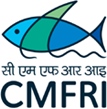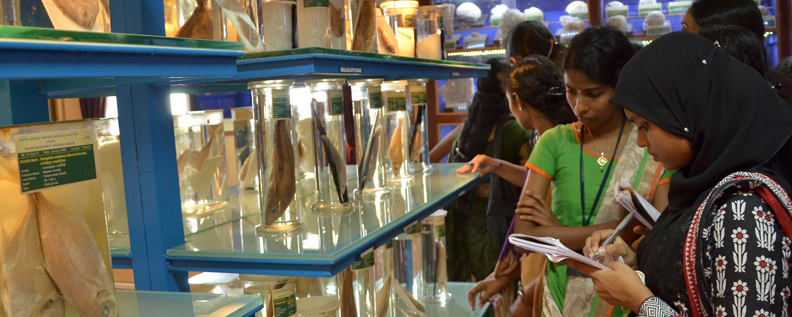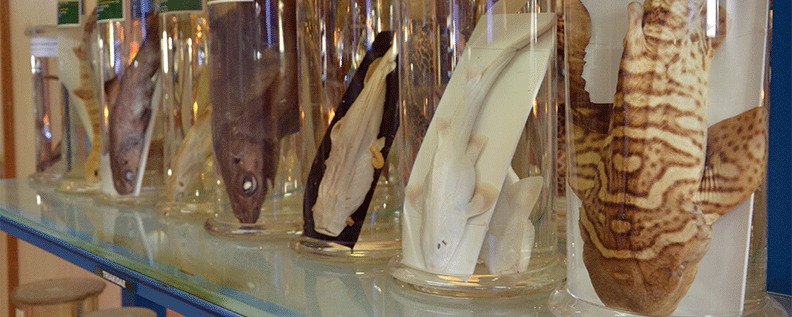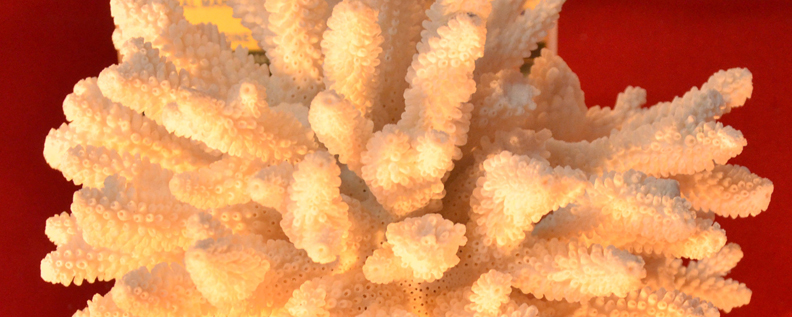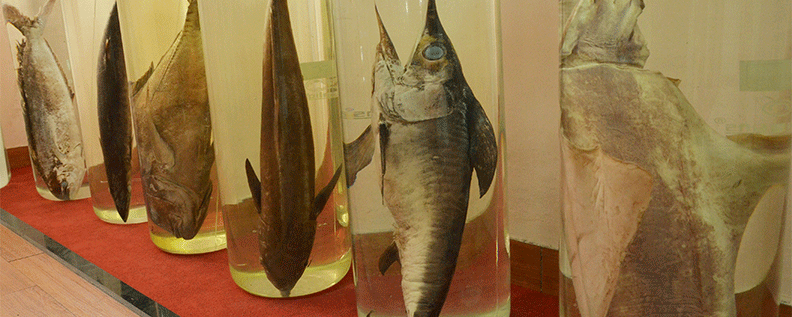Home MARINE BIODIVERSITY MUSEUM
The National Marine Biodiversity Museum at CMFRI is one of the oldest museums in the country which aims to collect, preserve, catalogue and display species occurring along the marine and coastal environments for the education of researchers and public. The Museum was established at the Headquarters in the present building of ICAR CMFRI and has expanded and grown in stature and collections to the status of the Designated National Repository.The Central Marine Fisheries Research Institute, Cochin was recognized as a ‘Designated National Repository’ by the Government of India, in December 2007 in consultation with the National Biodiversity Authority under the Biological Diversity Act, 2002. A Designated National Repository (DNR) is an Institution authorized to keep in safe custody specimens of different categories of biological material. Researchers in the field of Marine Sciences can now deposit their valuable holotype specimens (species new to science) and new records in the Marine Biodiversity Museum of CMFRI. Quoting the Accession Numbers given to the specimens, the findings can be reported in scientific journals of repute. Marine Biodiversity Museum, established at the Headquarters of the Institute offers a glimpse of the biodiversity of the Indian seas displaying specimens collected from marine environments and estuaries. The collections, arranged systematically for a better understanding of the resources, attracts students, teachers, scientists and the general public hailing from different States and Union Territories of the country, the students forming more than 80% of the total visitors.The purpose of establishing the Marine Biodiversity Museum at CMFRI is to collect, preserve, catalogue and display of species occurring along the marine and coastal environments for the education of researchers and public. The Marine Biodiversity Museum, established at the Headquarters of the Institute offers a glimpse of the biodiversity of the Indian seas displaying specimens collected from estuaries and coastal and deeper waters. The collections, arranged systematically for a better understanding of the resources, attracts students, teachers, scientists and the general public hailing from different States and Union Territories of the country, the students forming more than 80% of the total visitors.
LIST OF MUSEUM HOLDINGS
| Sl. No. | Group | No. of specimens |
| 1. | Algae | 97 |
| 2. | Porifera | 53 |
| 3. | Cnidarians | 231 |
| 4. | Crustaceans | 224 |
| 5. | Echinodermata | 53 |
| 6. | Fishes | 1266 |
| 7. | Molluscs | 20 |
| 8. | Ascidians | 20 |
| 9. | Seabirds | 08 |
| 10. | Sea snakes | 06 |
| 11. | Mammals | 03 |
| 12. | Others | 03 |
| 13. | Holotype | 77 |
| Total | 2748 |
VISITING THE MUSEUM
Visiting hours of Museum is 9.30 AM to 4.30 PM on all working days (Monday -Friday). The admission fee to Museum is Rs. 20/- for adults and Rs.10/- for students. School/College/University student/visitors are requested to take prior permission from Director ICAR -CMFRI, Cochin in advance. Museum is located behind the main HQ building in a separate annexe
Apply online. /Download Application Form
CATALOGUE
The CMFRI established its first Marine Museum with reference collections at Mandapam. This served as an important source of study material for researchers from all over the country. Four catalogues were brought out on the specimens in the reference collections of the Museum in late 1960s, in the form of Bulletins.
Catalogue of sponges, corals, polychaetes, crabs and echinoderms
Catalogue of fishes from the Laccadive Archipelago
Catalogue of molluscs, prawns, stomatopods and marine algae
Catalogue of fishes (excluding those from Laccadives)
Marine Biodiversity Museum (A Designated National Repository) Catalogue..
Two e-books on herbarium of Common Seaweeds and Sea grasses are available:
Common Seaweeds and Seagrasses of India Volume I
Common Seaweeds and Seagrasses of India Volume II
ACCESSION NUMBERS
CMFRI Museum offers Scientist / Researchers the facility to deposit their valuable holotype / paratype specimens/collection material in the Museum. Accession numbers will be provided for the specimens deposited in the Museum. The accession numbers can be utilized for publishing research articles on the same in the referred journals. Scientist / Researchers are requested to submit their specimen along with a request to Scientist in Charge NDR of ICAR CMFRI for obtaining the Accession Number. Format of the application form is attached. Before submitting kindly refer the Catalogue with the list of specimens given in the Museum Catalogue in order to avoid the duplication of the submission.
Download Application for Accession Number:
SPECIES DEPOSITION RECORDS IN 2023
| Fishes | ||
|---|---|---|
| Sl. No. | Name | |
| 1 | Aetobatus ocellatus (Kuhl, 1823) | |
| 2 | Stemonosudis rothschildi Richards, 1967 | |
| 3 | Cirrhitichthys bleekeri Day, 1874 | |
| 4 | Mulloidichthys ayliffe Uiblein, 2011 | |
| 5 | Cetoscarus ocellatus (Valenciennes, 1840) | |
| 6 | Choridactylus multibarbus Richardson, 1848 | |
| 7 | Lepidotrigla bispinosa Steindachner, 1898 | |
| Crustaceans | ||
| Sl. No. | Name | |
| 1 | Calappa bilineata Ng, Lai & Aungtonya, 2002 | |
| 2 | Calappa exanthematosa Alcock & Anderson, 1894 | |
| 3 | Mursia spp | |
| 4 | Mursia bicristimana Alcock & Anderson, 1894 | |
| 5 | Lauridromia dehaani (Rathbun, 1923) | |
| 6 | Paguropsis typica Henderson, 1888 | |
| 7 | Monomia gladiator (Fabricius, 1798) | |
| 8 | Paramaya mulli Ng, Prema & Ravichandran, 2018 | |
| Mollusca | ||
| Sl. No. | Name | |
| 1 | Ancistrocheirus lesueurii (d'Orbigny in Férussac & d'Orbigny, 1842) | |
| 2 | Opisthoteuthis philipii Oommen, 1976 | |
| 3 | Thaumoctopus mimicus (Norman and Hochberg, 2006 | |
| 4 | Sepia arabica Massy, 1917 | |
| 5 | Euprymna hyllebergi Nateewathana, 1997 | |
- Home
- COVID-19 Advisories
- Director's Message
- Centre of Excellence (Dr.EGS - CoEI)
- CMFRI in Media
- MFIS
- Latest Research Findings
- Fish Catch Estimates
- Infographics
- Fished Taxa Listing
- CMFRI Nutraceuticals
- Training Courses
- Job Opportunities
- Tenders
- Patents
- Awards
- Fish Seed for Sale
- Museum
- KVK / Services / Swachh Bharat
- Staff
- Consultancy
- CMFRI Theme Song
- Downloads
- Official Language
- Right to Information
- Public Interest Disclosure & Protection of Informers (PIDPI)
- Links
EVENT CALENDAR
February 2023

